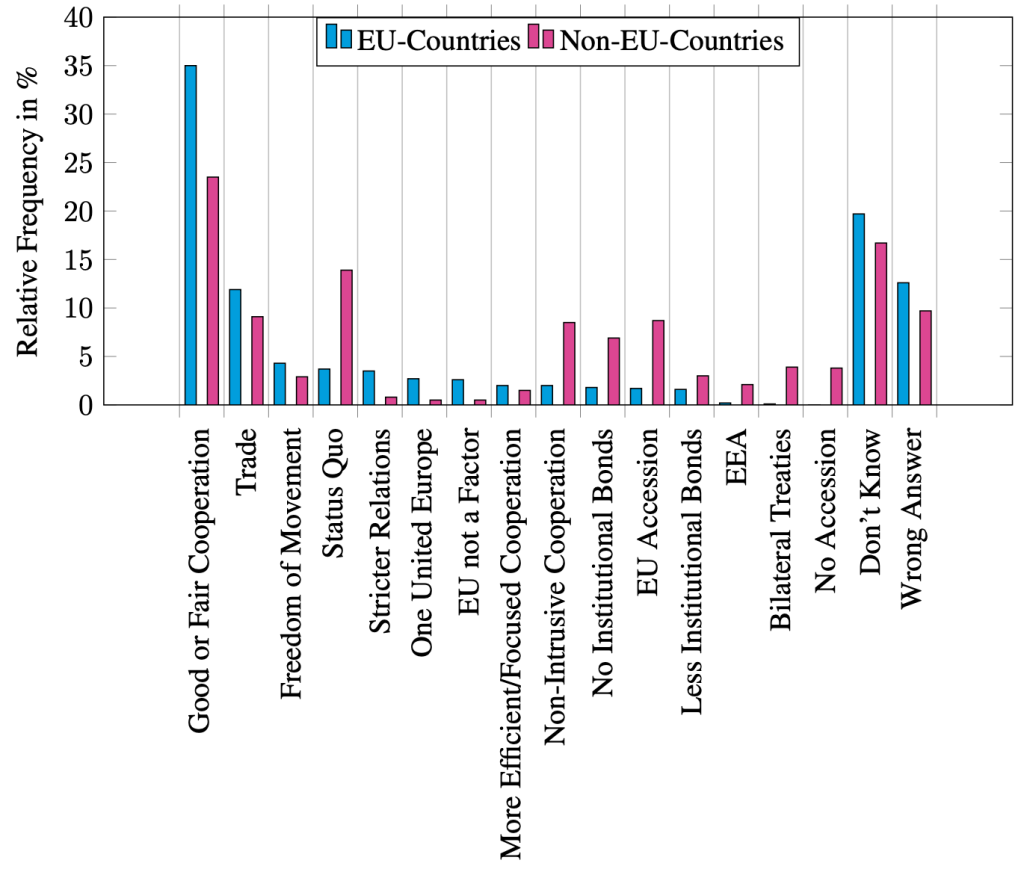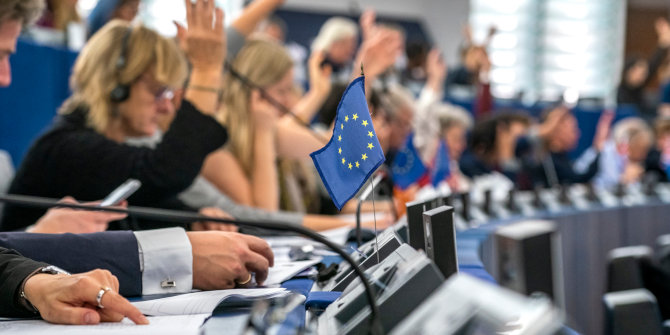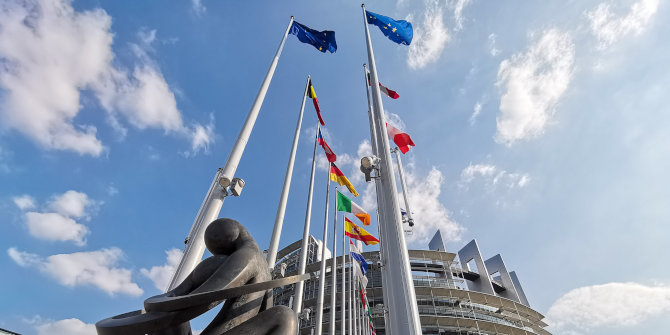Brexit and Russia’s invasion of Ukraine have raised important questions about the future of European integration. But what do people across Europe want? Drawing on a new study, Lukas B. Hoffmann and Andreas C. Goldberg examine the views of citizens in five EU and three non-EU countries.
Four years after the UK’s withdrawal from the EU, the consequences are still unclear. The political landscape in the UK has been in turmoil ever since and public opinion about Brexit is sharply polarised. But Brexit has also laid bare the lack of a plan for Europe’s future, i.e. for the relationships between Europe’s EU and non-EU countries – what we call “EUrope”. The remaining EU27 are still to find a long-term solution for their relationship with the UK while other non-EU countries, such as Norway and Switzerland, fear for their carefully tailored (individual) relationships with the EU.
Recently, however, there has been an increase in support for the European project, partly as a reaction to Brexit and partly in opposition to Russia’s invasion of Ukraine. This has brought the prospect of further European integration back onto the agenda. However, little is known about the kind of “EUrope” that EU citizens as well as the citizens of other European countries want.
Citizen perspectives
To address this gap, we asked citizens from eight countries for their perspectives. The countries included five EU member states – Denmark, Germany, Hungary, the Netherlands and Spain – and three non-EU countries – Norway, Switzerland and the UK.
In total, our survey covered 4,548 people. Questions included socio-demographic questions and several questions on political attitudes as well as an open-ended question asking for each respondent’s views on the future of “EUrope”. We then grouped the latter responses into different categories. Figure 1 shows categories that were mentioned by at least 2% of respondents in either EU or non-EU countries.
Figure 1: Categories mentioned by at least 2% of respondents
Note: For more information, see the authors’ accompanying paper at European Union Politics
Our findings show that the views of citizens are more complex than a simple divide between those who favour more integration and those who oppose it. Some responses can be placed on this dimension, such as the “One United Europe” and the “No Institutional Bonds” categories, which each reflect absolute positions on European integration. However, many participants gave more nuanced answers that match other dimensions as well.
While many responses had a general focus, such as the “Good or Fair Cooperation” and “Status Quo” categories, a significant number of responses were focused on particular policy domains such as trade. We also found the advantages of European integration are most visible to citizens when it comes to travelling or working across borders, as shown by the “Freedom of Movement” category being important in both EU and non-EU countries.
Alongside more general preferences, some EU respondents seemed to have a clear idea of what they want – and do not want – from “EUrope”. We found opposition to non-EU member states “cherry picking” the types of integration they are involved in (“Stricter Relations”), as well as support for cutting back on red tape (“More Efficient Cooperation”).
EU vs non-EU citizens
It is clear from the responses that the views of non-EU citizens are more polarised and heterogenous than those of EU citizens. While cutting ties with other European countries (“No Institutional Bonds”) was only mentioned by a small fraction of respondents in EU states, responses in this category were relatively common among non-EU citizens. Many non-EU citizens also expressed a desire for “Non-Intrusive Cooperation” in specific policy domains, without interference in domestic affairs.
However, a considerable share of non-EU citizens were also in favour of joining or rejoining the EU, while others backed maintaining the status quo. Moreover, we found differences between the three non-EU countries. UK respondents were more likely to mention rejoining the EU in comparison to the other two countries, while support for the status quo was particularly strong in Norway and Switzerland compared to the UK (and also when compared to EU citizens).
The tri-polarisation of views we found in the three non-EU countries can potentially be explained by the politicisation of their relationship with the EU. The issue appears far more urgent for these three countries than might be the case for EU member states and there is a lot more at stake politically. The heated nature of recent debates over Brexit are also an important factor, not only in the UK but also in Norway and Switzerland.
Individual predispositions
We found some evidence that the age, education and political ideologies of citizens are linked to their preferences. Highly educated and older respondents had more nuanced perspectives overall, with no obvious pattern of support for either more or less integration. Meanwhile, younger respondents tended to express general rather than specific views.
There were only marginal differences between male and female respondents, however men leaned toward perspectives that deviated from the status quo, while women tended to be more likely to express views in the “Good and Fair Cooperation” category. Finally, left-leaning citizens were more supportive of European integration and more likely to express views in the “United Europe” category. Right-leaning citizens were more likely to have perspectives in the “Trade”, “Status Quo” and “No Institutional Bonds” categories.
Drawing on lessons from recent referendums, such as the Scottish independence referendum in 2014 and the Brexit referendum in 2016, we expected an individual’s tendency toward risk-taking to have a link with their preferences. Specifically, we expected that those who favour risk-taking would also favour options that deviate from the status quo. However, contrary to our expectations, we found no evidence for this effect.
The need to take people seriously
European policymaking is detached from citizens to a far greater extent than in national politics. Brussels seems far away for many people and national discourses tend to focus on national rather than European issues, except when the EU serves as a useful scapegoat for problems.
Yet our findings show that a significant share of citizens not only have clear views on the future of Europe but are also capable of formulating complex and detailed perspectives. This underlines the importance of European policymakers and researchers taking the views of citizens seriously. There is a clear need to build on initiatives such as the Conference on the Future of Europe that aim to give citizens a platform to express their views. This would not only improve the EU’s policymaking process but would also go some way toward improving the overall legitimacy of the European integration project.
For more information, see the authors’ accompanying paper at European Union Politics
Note: This article gives the views of the authors, not the position of EUROPP – European Politics and Policy or the London School of Economics. Featured image credit: Simon Walker / No 10 Downing Street (CC BY-NC-ND 2.0). Profile picture of Lukas B. Hoffmann credit: Djamila Heß






